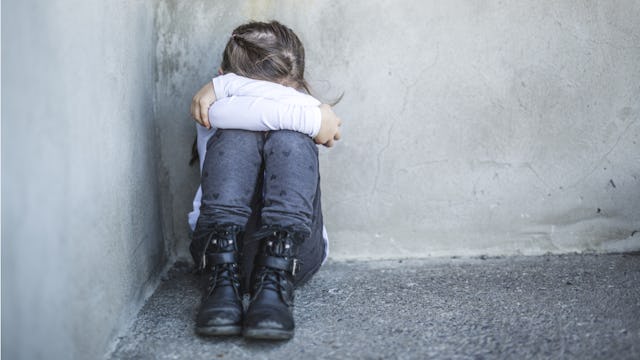When The Bully Lives Inside Your Child's Brain

Someone is tormenting my child.
This bully won’t leave my daughter alone. They won’t let her be, filling her with dread each day. No matter what she does or where she goes, they follow her. She’s tried talking nicely to them, tried ignoring them, tried getting tough with them, but nothing seems to work for very long.
They’re relentless. And they live inside her own brain.
Until I had kids, I thought I knew what anxiety looked like, but I’d never seen it up close. Not the way I’ve seen it work on my daughter’s psyche. Her anxiety really does function like a bully, taking advantage of her fears, pushing just the right buttons to paralyze her, never letting up until she feels like she’s going to break.
When the bully lives in your child’s brain, though, there’s no escape. My daughter can’t come home and hide in her room to get away from it. She can’t go to a teacher or principal or parent for intervention. I mean, she comes to us for help when she’s feeling anxious, but there are times — too many times — that we can’t do anything to make the bully back down.
Sometimes it helps me to give her anxiety a persona, to see it as something completely separate from her. My daughter is strong, courageous, kind, and talented. This fear that grabs her by the throat doesn’t seem like her. That’s why it seems like a bully — an unwelcome visitor who only comes around to wreak havoc and cause problems.
I know from a clinical standpoint that her anxiety is merely a natural psychological response gone haywire. We all have fear, but most of us have mental mechanisms that keep it in check and regulate it so it doesn’t rule our lives.
My daughter’s mental mechanisms don’t function properly. That’s what’s actually happening when the anxiety strikes. We can work on those mechanisms through cognitive behavioral therapy, solution-based therapy, exposure therapy, and a dozen other kinds of therapy. We can work on those mechanisms with medication. We can tell ourselves that it’s just mental cogs malfunctioning to help us understand what’s going on in her brain.
But all the understanding in the world doesn’t make it not feel like bullying, and all the understanding in the world doesn’t make it go away. We can distract the perpetrator for a while, but at this point, we haven’t figured out a way to ditch them for good. All of the real-life bully-handling suggestions — ignore them, walk away from them, punch the bully in the nose when all else fails — none of those tactics apply when the bully lives in your kid’s head and speaks to them in their own voice.
Helping my daughter try to manage her anxiety is one of the hardest things I’ve had to do as a parent. It’s painful to watch your child struggle. It’s agonizing to feel helpless to help her. It’s frustrating to feel like you’re standing on one side of a soundproof glass wall while a bully taunts and torments your kid on the other side.
Anxiety is brutal. Obviously, it’s toughest on my kid, but it’s tough on me too. Parental empathy is a real thing, so I feel some of her anxiety as well as my own frustration at my own inability to fix it.
I wish I could march over to anxiety’s house and put an end to this business once and for all. But this bully doesn’t have parents and that house is my kid’s brain. So we do the best we can to give her to the tools to cope, and silently fume over how cruel bullies can be.